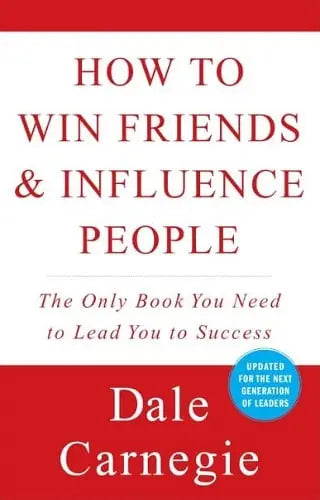How to Win Friends and Influence People by Dale Carnegie
(Because Apparently, We’re All Still Trying to Figure That Out)
You know that book that always seems to pop up in every “Top 10 Books to Change Your Life” list? The one your uncle swears “changed everything” for him in 1997? Yes, that one — How to Win Friends and Influence People by Dale Carnegie.
I finally decided to read it (decades late, I know) and honestly? I get the hype — and also the eyebrow raises.
🧠 The Big Idea
First published in 1936, this book is basically the OG self-help manual for social and professional success. Carnegie’s main thesis is simple but timeless: if you want to influence people, start by being genuinely interested in them.
The book is divided into neat, no-nonsense sections — how to handle people, how to make them like you, how to win them to your way of thinking, and how to be a good leader. It’s all about the soft skills we think we have, but often don’t: listening more than talking, remembering names, admitting mistakes, and giving honest appreciation.
💬 My Thoughts (and Mild Judgments)
The Good:
-
Timeless human psychology. Carnegie understood something we still forget in the age of Instagram reels: people just want to feel seen and valued. His advice to “talk in terms of the other person’s interests” is still gold.
-
Deceptively simple. You’ll find yourself thinking, “This is obvious!” — but then realizing you rarely do it. (Guilty.)
-
Stories over theory. Carnegie uses charming little anecdotes — like Abraham Lincoln’s humility or a grumpy letter-writing boss turned softie — that make the lessons stick.
The Less-Good:
-
Dated tone. Some examples feel like they belong in a sepia-toned office with typewriters clicking in the background.
-
People-pleasing energy. Occasionally, the advice teeters into “smile and agree no matter what,” which might not sit well in today’s world of boundaries and burnout.
-
Gender balance who? Written in a very male-dominated era, it’s not exactly intersectional — but the principles still hold water if you mentally update the context.
💡 Who Should Read It
-
Anyone in sales, leadership, or people-heavy careers.
-
Introverts who want a blueprint for social grace without turning into a fake-smile robot.
-
Or honestly, anyone who’s ever walked away from a conversation thinking, “Why did I say that?” (Again — guilty.)
📚 Favorite Takeaways
“You can make more friends in two months by becoming interested in other people than you can in two years by trying to get people interested in you.”
It’s almost disarming in its simplicity. Carnegie’s charm lies in reminding us that success — personal or professional — often starts with kindness, humility, and curiosity.
🌟 Final Verdict: 4.5/5 Stars
How to Win Friends and Influence People may be vintage, but it’s vintage with value. It’s a social compass dressed up as a self-help book — a reminder that good manners and empathy never go out of style.
🛍️ Where to Find It
If you’re based in the UAE, support a regional bookseller and grab your copy from BookBoss.ae — they often have classics like this in stock. (Affiliate link — thank you for supporting indie reviewers like me!)

